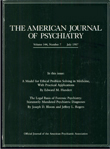Prophylactic efficacy of phenelzine and imipramine in chronic atypical depression: likelihood of recurrence on discontinuation after 6 months' remission
Abstract
OBJECTIVE: Demonstration of antidepressant efficacy beyond 6 months has infrequently been addressed, and no long-term efficacy data exist for patients with chronic atypical depression. METHOD: Sixty patients with atypical depression (according to Columbia University criteria) of at least 2 years' duration and who had improved with imipramine or phenelzine were stabilized for 6 months and then randomly continued the same medication or placebo for 6 months. RESULTS: Several baseline differences suggested that patients who entered the discontinuation trial on a regimen of phenelzine were more chronically depressed than the imipramine-treated patients. Survival analysis showed a marked advantage for phenelzine relative to placebo. In addition, patients switched to placebo from phenelzine experienced a recurrence of depressive symptoms significantly more often than patients switched to placebo from imipramine. Patients maintained with imipramine did not have lower relapse rates than those switched from imipramine to placebo. Recurrence rates were 23% for patients maintained on a regimen of phenelzine, 41% for those maintained on a regimen of imipramine, 47% for those switched from imipramine to placebo, and 87% for placebo- treated patients originally treated with phenelzine. CONCLUSIONS: Patients with chronic atypical depression are at high risk of recurrence if phenelzine is withdrawn 6 months after initial improvement. Similar findings were not demonstrated for imipramine; this replicates acute trials demonstrating imipramine's relative ineffectiveness in patients with atypical depression. Differences in recurrence rates after the switch to placebo from phenelzine and imipramine could be due to the two drugs' different mechanisms of action or to baseline differences in the two populations.



